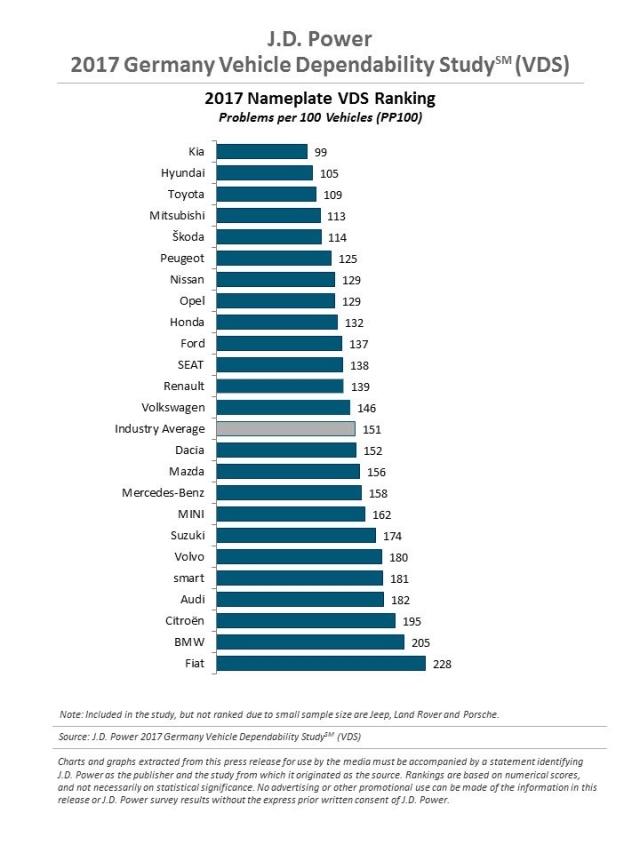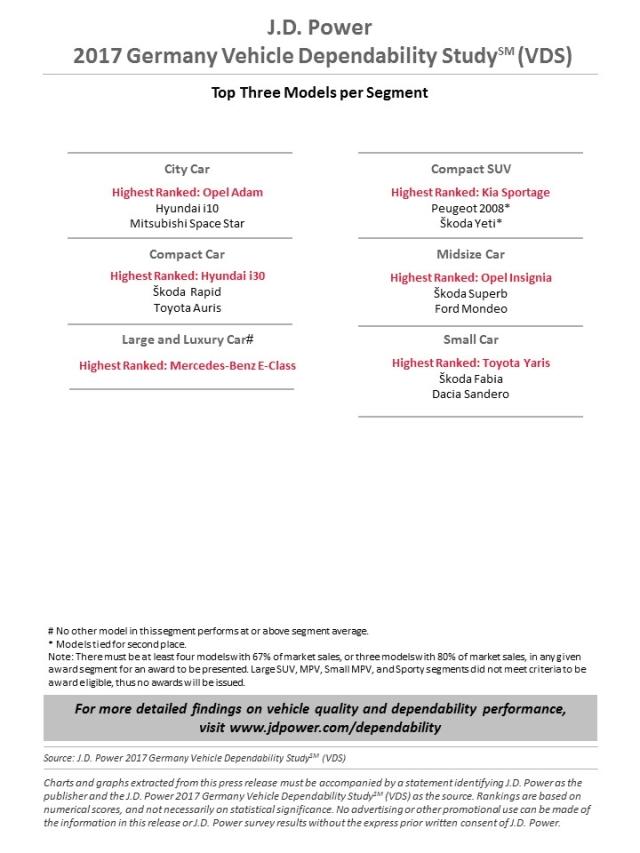Vehicle Design Issues and Defects Affect Customer Loyalty, J.D. Power Finds
Kia Ranks Highest in Vehicle Dependability among Brands in Germany
MUNICH: 18 July 2017 — A problem-free experience in the first three years of vehicle ownership has a significant effect on an owner’s intention to purchase the same brand, according to the J.D. Power 2017 Germany Vehicle Dependability StudySM (VDS), released today.
The study, now in its third year, measures problems experienced during the past 12 months by original owners of vehicles in Germany after 12-36 months of ownership. The study examines 177 problem symptoms across eight categories: vehicle exterior; driving experience; features/controls/displays (FCD); audio/communication/entertainment/navigation (ACEN); seats; heating, ventilation and air conditioning (HVAC); vehicle interior; and engine and transmission. Overall dependability is determined by the number of problems experienced per 100 vehicles (PP100), with a lower score reflecting higher quality.
Design problems generally refer to components or features that may be functioning properly but are still perceived as problems by owners because they are difficult to understand or use. Examples include controls that are overly complicated or features that are difficult to operate due to poor location. Defects or malfunction problems generally refer to a complete breakdown or malfunction of any component, feature or item. Examples include components that stop functioning and trim pieces that break or come loose.
Both defect and design problems have a strong negative effect on owner loyalty. In fact, the gap between owners who experience at least one design problem and those who do not is slightly wider than between those who experience at least one defect problem and those who do not, among both premium and volume owners. Owners not only perceive both categories as important, but they also are actually less likely to be loyal when experiencing design problems than when they experience defect problems.
“Minor issues like road noise, excessive fuel consumption and worn or faded materials are difficult to fix at a service appointment and, if the owner has to live with these design problems, they’re less likely to purchase the same brand in the future,” said Mark Lendrich, head of research at J.D. Power Europe. “Even a lightbulb that fails repeatedly can cause frustration. Automakers need to be aware of how these things can affect brand loyalty.”
Fuel efficiency is one of the most important reasons owners purchase their vehicle. Owners who report experiencing an excessive fuel consumption problem (industry average 1.1 PP100) are among the least satisfied owners in the study. This is particularly troublesome for volume brand owners: fuel efficiency is the second-most cited reason (48%) volume-brand owners purchased their vehicle, trailing only purchase price (51%).
The industry average for vehicle dependability is 151 PP100, up from 127 PP100 in 2016. The increase is due in part to a 4.5 PP100 increase in the engine and transmission category. Premium brands rank worse than the industry average.
“Premium brands have more technology, come fully equipped and owners drive more kilometers a year, so there are more things that can go wrong or be perceived as a problem,” Lendrich said. “It’s not necessarily an issue of quality, but as automakers continue to add features to a premium vehicle, they should note the common issues that current owners cite.”
Study Rankings
Kia ranks highest in vehicle dependability among all brands, with a score of 99 PP100. Hyundai ranks second with 105 PP100, followed by Toyota with 109 PP100, Mitsubishi with 113 PP100 and Škoda with 114 PP100.
Opel has two models (Adam and Insignia) that receive segment awards. Hyundai i30, Kia Sportage, Mercedes-Benz E-Class and Toyota Yaris also receive a segment award.
The 2017 Germany Vehicle Dependability Study is based on responses from nearly 14,000 owners of 2014-2016 model-year vehicles. The study was fielded from February through April 2017.
See the online press release at http://www.jdpower.com/pr-id/2017105.
J.D. Power is a global leader in consumer insights, advisory services and data and analytics. These capabilities enable J.D. Power to help its clients drive customer satisfaction, growth and profitability. Established in 1968, J.D. Power is headquartered in Costa Mesa, Calif., and has offices serving North/South America, Asia Pacific and Europe. J.D. Power is a portfolio company of XIO Group, a global alternative investments and private equity firm headquartered in London, and is led by its four founders: Athene Li, Joseph Pacini, Murphy Qiao and Carsten Geyer.
Additional study results are published in the AUTO TEST supplement to SPORT BILD, on newsstands on July 19, and in the 5/17 issue of AUTO TEST – Der Kaufberater, on newsstands on July 26.
Media Relations Contacts
Mark Lendrich; J.D. Power; Munich, Germany; Tel: +49 (0)89-288 03 66-11; mark.lendrich@jdpa.com
Tobias Franzke; AUTO TEST; Tel: +49 (0)9122 63 13 100; tobias.franzke@autobild.de
Geno Effler; J.D. Power; Costa Mesa, Calif., USA; +1 714-621-6224; media.relations@jdpa.com
About J.D. Power and Advertising/Promotional Rules www.jdpower.com/about-us/press-release-info
About AUTO TEST
AUTO TEST is a member of the international AUTO BILD group published by Axel Springer. Since 2003, AUTO TEST has been the leading special interest magazine for readers who are planning to buy a new car. More than 500 cars are tested each year, with over a million kilometers driven to provide readers with detailed and objective model reviews to help them choose the best car for their money. Readers can also find tips on cutting running costs, used cars, service, finance and accessories.

